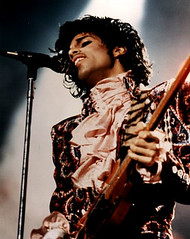If you’ve read my blog on a fairly regular basis, you know that I’m a music fan and, as a result, fascinated with music marketing. Music marketing is especially fascinating to me because, as Seth Godin points out in his Music Lessons post, since the music industry is falling apart, it provides a unique glimpse into the rise and innovation of online marketing and a demonstration of conversational marketing.
It began to dawn on me as I began following MP3 blogs that due to the phenomenal variety and volume of music that is now easily accessible through MySpace and MP3 blog aggregators like elbo.ws and Hype Machine, through music discovery services like last.fm and popular music blogs like stereogum, indiefeed and Aquarium Drunkard, the audience for bands and musicians is fragmenting radically. Music is no longer easily classified by genre.
This phenomenon has been discussed by New York Times columnist David Brooks and was recently a topic of conversation for Minnesota Public Radio’s Midmorning program.
For the music fan in me, this fragmentation is fantastic because it means I have a vast array of new (for me) music to which, until now, I would never have had access.
But the marketer in me sees the death of nostalgia marketing. For whatever reason, music has a unique ability to trigger emotions. I have memories of listening to the hit songs of 70s rock bands through the crackly AM band on my dad’s transistor radio. Songs from the 80s spark general memories of my college years.
It is because of this phenomenon that you see the nostalgia marketing of music compilation CDs from a given era through late night infomercials replete with your "hosts" saying remember when all the time. I couldn’t find an actual example on YouTube, but this is a clever spoof of those infomercials that gets the idea across:
Specific songs recall specific events and that phenomenon will remain. But because the channels through which we hear music are now practically infinite–terrestrial-, Internet-, and HD-radio stations, television, YouTube, music blogs and podcasts, our phones and video games–the concept of a broadly popular music star is fading away.
The same dynamic will likely hold true for movies and television programming.
With no broadly popular music star or movie or television show, the common touchstone, the shared experience of liking the similar thing that makes nostalgia marketing work, is eliminated. Is, then, nostalgia marketing viable? I think not. At least not on a broad scale.
The e-Strategy Academy covers all aspects of digital marketing including search optimization & marketing, email marketing, social media marketing, video marketing, mobile marketing & public relations.
